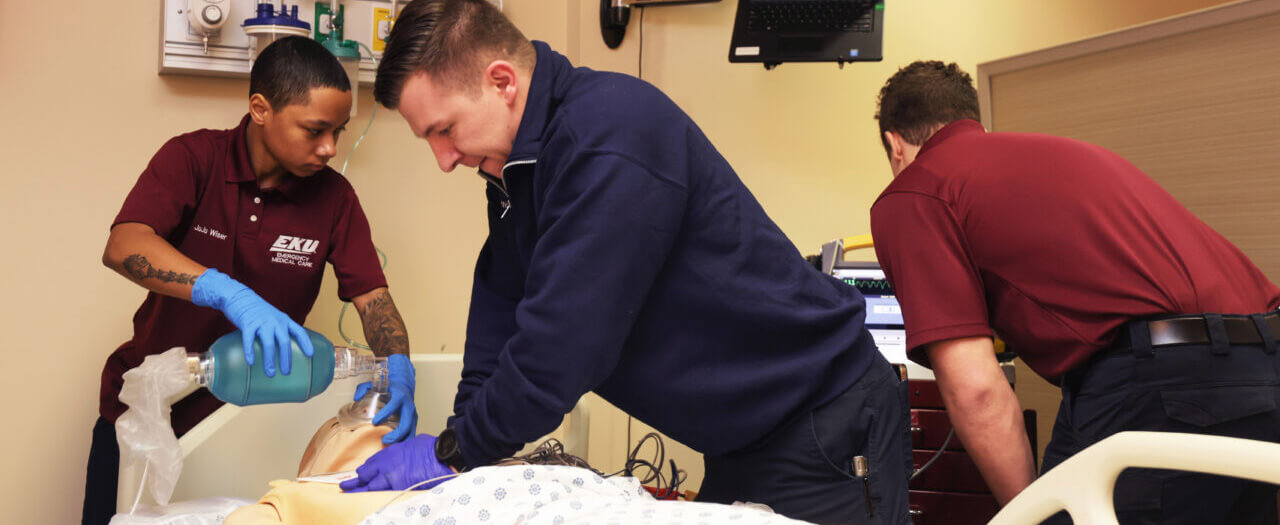Performing life-saving CPR, administering critical medication and safely moving a patient on a stretcher are just a few of the hands-on skills learned in Eastern Kentucky University’s (EKU) Emergency Medical Care (EMC) program. As the longest-accredited program in Kentucky and the second longest-accredited program in the United States, EKU’s EMC program has been preparing students to save lives since the 1970s.
“From the first responder on the scene to the nurse providing care at the hospital to the therapist aiding in rehabilitation, EKU’s integrated healthcare-related programs allow our graduates to serve valuable roles in communities across the Commonwealth,” said EKU President David McFaddin. “With our reputable programs, such as EMC, we want to expand our healthcare education options, providing collaborative learning opportunities for students and greater medical access to rural Kentuckians.”
For students like JuJu Wiser, a junior from Frankfort, Kentucky, real-life situations with hands-on experience start on day one in the EMC program.
“Even while we were learning the basics, we were already in the field,” said Wiser. “We were getting out there and seeing how we could apply what we were doing in labs to the real world.”
Wiser said she started considering the emergency medical field in high school. Once she learned more about EKU’s program, there was no question about where she wanted to go to college.
“In high school, people start to ask what you want to do for the rest of your life,” said Wiser. “At first, I was leaning toward firefighting, but I’ve always been more interested in the medical side of things. When I found out that EKU had a program for EMC, it intrigued me. I decided to see if I would like it, and it turned out that I loved it.”
Wiser, who hopes to become a travel paramedic and later expand her career into nursing, added that it has been especially helpful to work in local communities.
“It’s good to get to go to different communities and see how different the calls go,” she said. “If you’re somewhere like Lexington that has a higher volume and where there are plenty of hospitals, your transport times are not that long. In a smaller town though, there are not as many ambulances. The skills are still the same, but seeing how they operate differently has been interesting.”
Though she has gotten plenty of hands-on experience in the program, Wiser said what she’s learned in the classroom and lab have been just as important.
“My favorite thing about the classroom is it’s OK to mess up,” she said. “If you make a mistake in the classroom, you’re not putting a person’s life at risk. It gives you the opportunity to learn from your mistakes and how to better deal with certain scenarios.”
The lab and classroom instruction ensure students are ready to provide quality patient care upon graduation. Through a comprehensive curriculum and in-the-field experience, EKU’s EMC program prepares students for careers as paramedics and emergency medical technicians.
In addition to the EMC program, EKU offers several well-established healthcare programs, preparing students for careers in nursing, occupational therapy, public health, food and nutrition, exercise and sport science and more. With existing healthcare-related programs and the proposed College of Osteopathic Medicine, EKU continues to expand its commitment to training the next generation of healthcare professionals.
Interested in a degree from EKU?
Earn your undergraduate, graduate or doctoral degree from a university that has been an education leader for more than 100 years. Choose from a variety of in-demand and nationally recognized academic programs, offered both online and on-campus.
Whether you want to start, finish or advance your education, EKU has a program that can fit your schedule and your needs. Complete the form to learn more about how EKU can help advance your career.
Eastern Kentucky University is accredited by the Southern Association of Colleges and Schools Commission on Colleges (SACSCOC) to award associate, baccalaureate, masters, educational specialist, and doctorate degrees.


